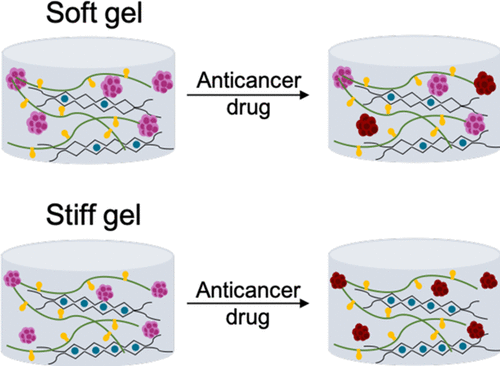当前位置:
X-MOL 学术
›
Biomacromolecules
›
论文详情
Our official English website, www.x-mol.net, welcomes your
feedback! (Note: you will need to create a separate account there.)
Matrix Stiffness-Regulated Growth of Breast Tumor Spheroids and Their Response to Chemotherapy
Biomacromolecules ( IF 5.5 ) Pub Date : 2020-11-02 , DOI: 10.1021/acs.biomac.0c01287 Yunfeng Li 1 , Nancy Khuu 2 , Elisabeth Prince 2 , Huachen Tao 2 , Ningtong Zhang 2 , Zhengkun Chen 2 , Albert Gevorkian 2 , Alison P McGuigan 3, 4 , Eugenia Kumacheva 2, 3, 4
Biomacromolecules ( IF 5.5 ) Pub Date : 2020-11-02 , DOI: 10.1021/acs.biomac.0c01287 Yunfeng Li 1 , Nancy Khuu 2 , Elisabeth Prince 2 , Huachen Tao 2 , Ningtong Zhang 2 , Zhengkun Chen 2 , Albert Gevorkian 2 , Alison P McGuigan 3, 4 , Eugenia Kumacheva 2, 3, 4
Affiliation

|
Interactions between tumor cells and the extracellular matrix (ECM) are an important factor contributing to therapy failure in cancer patients. Current in vitro breast cancer spheroid models examining the role of mechanical properties on spheroid response to chemotherapy are limited by the use of two-dimensional cell culture, as well as simultaneous variation in hydrogel matrix stiffness and other properties, e.g., hydrogel composition, pore size, and cell adhesion ligand density. In addition, currently used hydrogel matrices do not replicate the filamentous ECM architecture in a breast tumor microenvironment. Here, we report a collagen-alginate hydrogel with a filamentous architecture and a 20-fold variation in stiffness, achieved independently of other properties, used for the evaluation of estrogen receptor-positive breast cancer spheroid response to doxorubicin. The variation in hydrogel mechanical properties was achieved by altering the degree of cross-linking of alginate molecules. We show that soft hydrogels promote the growth of larger MCF-7 tumor spheroids with a lower fraction of proliferating cells and enhance spheroid resistance to doxorubicin. Notably, the stiffness-dependent chemotherapeutic response of the spheroids was temporally mediated: it became apparent at sufficiently long cell culture times, when the matrix stiffness has influenced the spheroid growth. These findings highlight the significance of decoupling matrix stiffness from other characteristics in studies of chemotherapeutic resistance of tumor spheroids and in development of drug screening platforms.
中文翻译:

基质刚度调节乳腺肿瘤球体的生长及其对化学疗法的反应
肿瘤细胞与细胞外基质(ECM)之间的相互作用是导致癌症患者治疗失败的重要因素。目前的体外乳腺癌球体模型研究了力学性能对球体对化学疗法的反应的作用,这受限于二维细胞培养的使用,以及水凝胶基质刚度和其他性质(例如水凝胶组成,孔径)的同时变化,以及细胞粘附配体的密度。另外,当前使用的水凝胶基质在乳腺肿瘤微环境中不能复制丝状ECM结构。在这里,我们报道了一种胶原-藻酸盐水凝胶,其结构呈丝状且刚度变化了20倍,而与其他特性无关,用于评估雌激素受体阳性乳腺癌的球体对阿霉素的反应。水凝胶力学性能的变化是通过改变藻酸盐分子的交联度来实现的。我们表明,软水凝胶可促进较大MCF-7肿瘤球的生长,并具有较低的增殖细胞比例,并增强球体对阿霉素的抗性。值得注意的是,球体的刚度依赖性化学治疗反应是暂时介导的:当基质刚度影响球体的生长时,在足够长的细胞培养时间内就很明显。这些发现凸显了将基质刚度与其他特征脱钩的重要性,这在研究肿瘤球体的化学治疗抗性和开发药物筛选平台中具有重要意义。水凝胶力学性能的变化是通过改变藻酸盐分子的交联度来实现的。我们表明,软水凝胶可促进较大MCF-7肿瘤球的生长,并具有较低的增殖细胞比例,并增强球体对阿霉素的抗性。值得注意的是,球体的刚度依赖性化学治疗反应是暂时介导的:当基质刚度影响球体的生长时,在足够长的细胞培养时间内就很明显。这些发现凸显了将基质刚度与其他特征脱钩的重要性,这在研究肿瘤球体的化学治疗抗性和开发药物筛选平台中具有重要意义。水凝胶力学性能的变化是通过改变藻酸盐分子的交联度来实现的。我们表明,软水凝胶可促进较大MCF-7肿瘤球的生长,并具有较低的增殖细胞比例,并增强球体对阿霉素的抗性。值得注意的是,球体的刚度依赖性化学治疗反应是暂时介导的:当基质刚度影响球体的生长时,在足够长的细胞培养时间内就很明显。这些发现凸显了将基质刚度与其他特征脱钩的重要性,这在研究肿瘤球体的化学治疗抗性和开发药物筛选平台中具有重要意义。我们表明,软水凝胶可促进较大MCF-7肿瘤球的生长,并具有较低的增殖细胞比例,并增强球体对阿霉素的抗性。值得注意的是,球体的刚度依赖性化学治疗反应是暂时介导的:当基质刚度影响球体的生长时,在足够长的细胞培养时间内就很明显。这些发现凸显了将基质刚度与其他特征脱钩的重要性,这在研究肿瘤球体的化学治疗抗性和开发药物筛选平台中具有重要意义。我们表明,软水凝胶可促进较大MCF-7肿瘤球的生长,并具有较低的增殖细胞比例,并增强球体对阿霉素的抗性。值得注意的是,球体的刚度依赖性化学治疗反应是暂时介导的:当基质刚度影响球体的生长时,在足够长的细胞培养时间内就很明显。这些发现凸显了将基质刚度与其他特征脱钩的重要性,这在研究肿瘤球体的化学治疗抗性和开发药物筛选平台中具有重要意义。当基质刚度影响了球体的生长时,在足够长的细胞培养时间中就很明显了。这些发现凸显了将基质刚度与其他特征脱钩的重要性,这在研究肿瘤球体的化学治疗抗性和开发药物筛选平台中具有重要意义。当基质刚度影响了球体的生长时,在足够长的细胞培养时间中就很明显了。这些发现凸显了将基质刚度与其他特征脱钩的重要性,这在研究肿瘤球体的化学治疗抗性和开发药物筛选平台中具有重要意义。
更新日期:2020-11-02
中文翻译:

基质刚度调节乳腺肿瘤球体的生长及其对化学疗法的反应
肿瘤细胞与细胞外基质(ECM)之间的相互作用是导致癌症患者治疗失败的重要因素。目前的体外乳腺癌球体模型研究了力学性能对球体对化学疗法的反应的作用,这受限于二维细胞培养的使用,以及水凝胶基质刚度和其他性质(例如水凝胶组成,孔径)的同时变化,以及细胞粘附配体的密度。另外,当前使用的水凝胶基质在乳腺肿瘤微环境中不能复制丝状ECM结构。在这里,我们报道了一种胶原-藻酸盐水凝胶,其结构呈丝状且刚度变化了20倍,而与其他特性无关,用于评估雌激素受体阳性乳腺癌的球体对阿霉素的反应。水凝胶力学性能的变化是通过改变藻酸盐分子的交联度来实现的。我们表明,软水凝胶可促进较大MCF-7肿瘤球的生长,并具有较低的增殖细胞比例,并增强球体对阿霉素的抗性。值得注意的是,球体的刚度依赖性化学治疗反应是暂时介导的:当基质刚度影响球体的生长时,在足够长的细胞培养时间内就很明显。这些发现凸显了将基质刚度与其他特征脱钩的重要性,这在研究肿瘤球体的化学治疗抗性和开发药物筛选平台中具有重要意义。水凝胶力学性能的变化是通过改变藻酸盐分子的交联度来实现的。我们表明,软水凝胶可促进较大MCF-7肿瘤球的生长,并具有较低的增殖细胞比例,并增强球体对阿霉素的抗性。值得注意的是,球体的刚度依赖性化学治疗反应是暂时介导的:当基质刚度影响球体的生长时,在足够长的细胞培养时间内就很明显。这些发现凸显了将基质刚度与其他特征脱钩的重要性,这在研究肿瘤球体的化学治疗抗性和开发药物筛选平台中具有重要意义。水凝胶力学性能的变化是通过改变藻酸盐分子的交联度来实现的。我们表明,软水凝胶可促进较大MCF-7肿瘤球的生长,并具有较低的增殖细胞比例,并增强球体对阿霉素的抗性。值得注意的是,球体的刚度依赖性化学治疗反应是暂时介导的:当基质刚度影响球体的生长时,在足够长的细胞培养时间内就很明显。这些发现凸显了将基质刚度与其他特征脱钩的重要性,这在研究肿瘤球体的化学治疗抗性和开发药物筛选平台中具有重要意义。我们表明,软水凝胶可促进较大MCF-7肿瘤球的生长,并具有较低的增殖细胞比例,并增强球体对阿霉素的抗性。值得注意的是,球体的刚度依赖性化学治疗反应是暂时介导的:当基质刚度影响球体的生长时,在足够长的细胞培养时间内就很明显。这些发现凸显了将基质刚度与其他特征脱钩的重要性,这在研究肿瘤球体的化学治疗抗性和开发药物筛选平台中具有重要意义。我们表明,软水凝胶可促进较大MCF-7肿瘤球的生长,并具有较低的增殖细胞比例,并增强球体对阿霉素的抗性。值得注意的是,球体的刚度依赖性化学治疗反应是暂时介导的:当基质刚度影响球体的生长时,在足够长的细胞培养时间内就很明显。这些发现凸显了将基质刚度与其他特征脱钩的重要性,这在研究肿瘤球体的化学治疗抗性和开发药物筛选平台中具有重要意义。当基质刚度影响了球体的生长时,在足够长的细胞培养时间中就很明显了。这些发现凸显了将基质刚度与其他特征脱钩的重要性,这在研究肿瘤球体的化学治疗抗性和开发药物筛选平台中具有重要意义。当基质刚度影响了球体的生长时,在足够长的细胞培养时间中就很明显了。这些发现凸显了将基质刚度与其他特征脱钩的重要性,这在研究肿瘤球体的化学治疗抗性和开发药物筛选平台中具有重要意义。











































 京公网安备 11010802027423号
京公网安备 11010802027423号